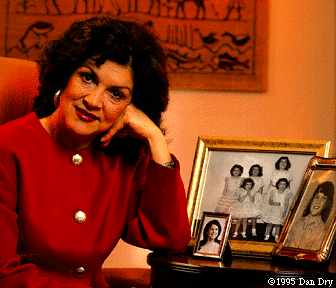
 The University of Chicago Magazine April 1995
The University of Chicago Magazine April 1995

By Tim Andrew Obermiller
THEY DIDN'T KNOW THAT at the University of Chicago, Marta Tienda chaired one of the country's premier sociology departments, or that she edited one of her field's most esteemed journals. Sociology was a moot term to these Chicago Latino high schoolers; the U of C was as distant from their lives as Saturn's rings.
Still, there was something about this petite woman with the raven hair and radiant smile that inspired their confidence enough to open up. Tienda was there to try to understand why Latino kids from low-income families tend to leave school and start jobs earlier than teens from other ethnic groups. Tape recorder running, she asked what they thought school was preparing them for, what they expected to do after they left--whether education, in short, had much to do with their private hopes and dreams.
Afterward, she inquired if the group had anything to ask her. A young man who'd shyly answered all her questions spoke up. "Can you tell me what do I do to find out about college? Who do I ask?"
Once she had been just as in the dark. Although her immigrant father insisted she finish high school, college was a foreign concept in a household devoid of newspapers and books. When her seventh-grade English teacher inquired about her future plans, she said she would be a beautician. The teacher asked her, "Why don't you want to go to college?" Tienda responded that her family had no money, that college was for "rich people."
"She said that wasn't true. That there were scholarships and ways that one could go to college. And I said, `There are?'"
Now she was delivering this same news with the urgency of a physician dispensing life-saving instructions. "There are teachers who praise you and encourage you," she told the teenager. "Those are the teachers who believe in you. Those are the teachers you must ask for help."
"I told him that," she later says, "because it was true for me. There was always somebody who came along at a critical moment in my life, who saw potential--even when I didn't see it in myself." And without them, she would have been a beautician? She frowns, shrugs, and breaks into a smile--a gesture that seems to answer "Who knows?" and "No way!" simultaneously.
In her nineteenth year as a sociologist, Marta Tienda is at the peak of her profession. Considered a leading expert on migration, employment, and poverty among Latinos, she has a curriculum vitae thick with publications (six books, and dozens of articles and chapters), honors (this fall she was awarded the University's first Ralph Lewis professorship in sociology), editorships (she concludes her four-year tenure as the American Journal of Sociology's editor this spring), and board memberships (she's a trustee of both the Russell Sage and Kaiser Family foundations).
With her imposing credentials, Tienda could be forgiven a bit of self-important swaggering, but grandiosity is not her style. She freely admits, for example, that when she opened her first faculty meeting as the new chair of sociology this past autumn, she was "scared." Yet her candor is so direct that, even used to admit a fear or insecurity, it comes across as strength. "I'm not usually one to hold back," she cheerfully acknowledges. In fact, whatever enterprise engages her--whether triple-checking a statistic on migrant unemployment, discussing the murkier passages of a student's research paper, or helping her two young sons with their homework--Tienda seems wholly committed, and expects the same from whoever sits across her table.
"As soon as I met her I realized she's incredibly energetic," says Grace Kao, AM'92, a graduate student who has worked with Tienda for the past four years. "She talks very fast. You walk with her, she walks fast. She does everything very quickly." A skit performed last spring at the department's annual Follies "featured two students playing Marta," says Kao, "and that explained why she seems to be everywhere at once."
Reminded of the skit, Tienda laughs. "No, actually there were three students playing me." Yet, later, she admits that most of her days end in exhaustion. What drives her on? An uncharacteristically long pause preludes the answer: "I want to grow. Because I do come from such a disadvantaged environment that everything is a new frontier for me. Nothing is taken for granted."
RAISED ON A SMALL RANCH in Mexico, Toribio Tienda illegally crossed the U.S. border as a teenager. In south Texas, he picked grapefruits and oranges for the citrus industry, meeting among the migrant workers there a young girl, Azucena, who would become his wife and Marta's mother.
They hadn't planned to marry so young--she was only 16, he was 18--but Toribio's arrest by the Immigration and Naturalization Service in 1946 forced the decision. Azucena was a U.S. citizen, raised in Mexico but born in Detroit. The marriage entitled Toribio to U.S. residency. Click here to continue "Necessary Dreams"
